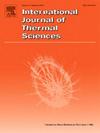解决总焓法振荡问题的新型液体馏分迭代法
IF 4.9
2区 工程技术
Q1 ENGINEERING, MECHANICAL
International Journal of Thermal Sciences
Pub Date : 2024-10-23
DOI:10.1016/j.ijthermalsci.2024.109492
引用次数: 0
摘要
几十年来,总焓法(TEM)一直被提出并用于解决等温和渐变相变问题。然而,最近对等温相变的研究发现,由于液体分数和焓之间的不一致,TEM 预测的相界面会随着空间和时间离散度的变化而摆动。为了解决这个问题,本文从广泛采用的热源法(HSM)中使用的液体分数迭代方法中汲取灵感,以确保液体分数和温度之间的一致性,引入了一种专门为 TEM 量身定制的新型液体分数迭代方法,称为迭代 TEM(ITEM)。该方法通过涉及纯物质熔化的实验基准进行了验证。网格和时间步长相关性研究证实,ITEM 能有效消除振荡,并在网格大小和时间步长方面表现出收敛性。此外,ITEM 的精确度与 HSM 相当。最后,研究了与 ITEM 相关的计算成本,发现一旦网格傅立叶数(Fo)超过 1,计算成本就会迅速增加。将网格傅里叶数保持在大约 0.5 以下,并确保松弛因子与网格傅里叶数之比接近 1,可以显著提高计算效率。松弛因子是液体分数迭代方案中的一个关键参数。本文章由计算机程序翻译,如有差异,请以英文原文为准。
A novel liquid fraction iteration methodology for addressing oscillatory issues in the total enthalpy method
The total enthalpy method (TEM) has been proposed and employed for several decades to address both isothermal and gradual phase change problems. However, recent investigations into isothermal phase changes have revealed that the phase interface predicted by the TEM oscillates with variations in spatial and temporal discretizations, due to the inconsistency between liquid fraction and enthalpy. To address this issue, and drawing inspiration from the liquid fraction iteration methodology used in the widely adopted heat source method (HSM) to ensure consistency between liquid fraction and temperature, this paper introduces a novel liquid fraction iteration methodology specifically tailored for the TEM, referred to as the iterative TEM (ITEM). This approach is validated against an experimental benchmark involving the melting of a pure substance. Grid and time-step dependence studies confirm that the ITEM effectively eliminates oscillations and exhibits convergence with respect to both grid size and time step. Moreover, the ITEM achieves accuracy comparable to that of the HSM. Finally, the computational costs associated with the ITEM are examined, revealing that costs increase rapidly once the grid Fourier number (Fo) exceeds one. Maintaining the grid Fo number below approximately 0.5 and ensuring the ratio of the relaxation factor to the grid Fo number to approach one significantly improve computational efficiency. The relaxation factor is a crucial parameter within the liquid fraction iteration scheme.
求助全文
通过发布文献求助,成功后即可免费获取论文全文。
去求助
来源期刊

International Journal of Thermal Sciences
工程技术-工程:机械
CiteScore
8.10
自引率
11.10%
发文量
531
审稿时长
55 days
期刊介绍:
The International Journal of Thermal Sciences is a journal devoted to the publication of fundamental studies on the physics of transfer processes in general, with an emphasis on thermal aspects and also applied research on various processes, energy systems and the environment. Articles are published in English and French, and are subject to peer review.
The fundamental subjects considered within the scope of the journal are:
* Heat and relevant mass transfer at all scales (nano, micro and macro) and in all types of material (heterogeneous, composites, biological,...) and fluid flow
* Forced, natural or mixed convection in reactive or non-reactive media
* Single or multi–phase fluid flow with or without phase change
* Near–and far–field radiative heat transfer
* Combined modes of heat transfer in complex systems (for example, plasmas, biological, geological,...)
* Multiscale modelling
The applied research topics include:
* Heat exchangers, heat pipes, cooling processes
* Transport phenomena taking place in industrial processes (chemical, food and agricultural, metallurgical, space and aeronautical, automobile industries)
* Nano–and micro–technology for energy, space, biosystems and devices
* Heat transport analysis in advanced systems
* Impact of energy–related processes on environment, and emerging energy systems
The study of thermophysical properties of materials and fluids, thermal measurement techniques, inverse methods, and the developments of experimental methods are within the scope of the International Journal of Thermal Sciences which also covers the modelling, and numerical methods applied to thermal transfer.
 求助内容:
求助内容: 应助结果提醒方式:
应助结果提醒方式:


